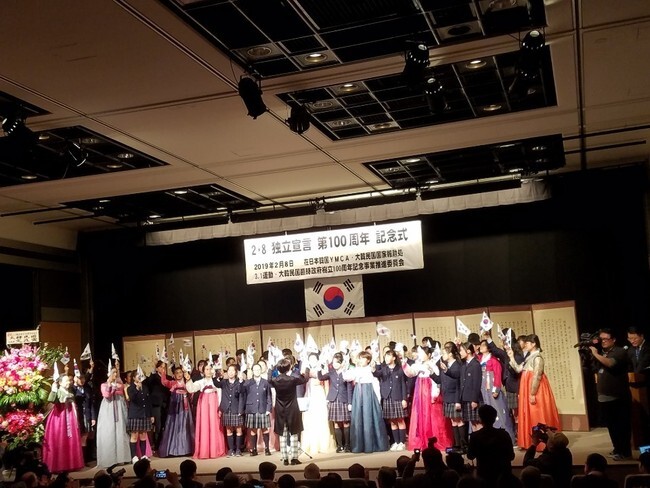hankyoreh
Links to other country sites 다른 나라 사이트 링크
[Column] Korea’s failure to reckon with its brutal history

This is a historic year, being the hundredth anniversary of the Feb. 8 Independence Declaration, the Mar. 1 Movement and the establishment of the Provisional Government in Shanghai. A century has passed since the fervor of the homegrown independence movement inspired the creation of the Republic of Korea on foreign soil.
The Republic of Korea’s first century has truly been a cruel one. No country in the world has suffered such a myriad of contradictions and conflicts throughout the modern era as Korea has. Korea’s recent history – marred by colonial occupation, division and war during the Cold War and a military dictatorship—has played host to all the dueling ideologies of modern civilization, including imperialism, nationalism, socialism, capitalism and democracy.
When we reflect upon the past century of Korean history, the most striking thing is that, despite the numerous tragedies produced by that cruel history, there has not been a proper reckoning for even one of them. Is there any country that has failed to reckon with its past to the same extent as the Republic of Korea?
Korea is a country in which a detective of the Japanese police who suppressed political dissent under during the colonial occupation kept torturing independence fighters as a Korean police officer even after Korea’s liberation; a country in which a former Japanese army officer became president after liberation and whose daughter eventually became president, too; a country whose national anthem was composed by a fascist who collaborated with the Japanese. In regard to reckoning with Koreans’ collaboration with the Japanese, the defanging of the Special Committee Investigating Anti-Korean Activities – which enabled collaborators to suppress nationalists during the early years of Korea’s liberation – was the watershed moment that set the course of history.
But collaboration with the Japanese under the colonial occupation is not the only historical problem. Civilian massacres, military dictatorship, judicial murders, criminal torture and academics on the government’s payroll – not one of these historical issues has been properly dealt with. Korean society today is still under the thumb of collaborators such as No Deok-sul, Song Yo-chan, Park Chung-hee, Yang Seung-tae, Lee Geun-an, Kal Bong-kun and their ilk.
Reckoning with the past is the prerequisite of social reform
These unresolved historical issues are the source of a peculiar stench that wafts through all sectors of Korean society. The histories of Japanese collaboration and dictatorial rule remain particularly relevant today. Just flip open a newspaper – the issue of compensation for Korean victims of forced labor and sexual slavery for the Japanese, cases of people being framed for espionage, and rash remarks about the Gwangju Uprising are all whiffs of that stench, to which we have become inured.
Reckoning with the past is the prerequisite of social reform. Without a historical reckoning, there can be no reform. Just take a look at the example of Germany. The student protests there in 1968 were a revolution aimed at reckoning with the past, and thanks to them, Germany was reborn as a country that had dealt with its past. That became the solid foundation for sweeping social reforms in the 1970s. The reason that the passion of Korea’s candlelit revolution died down so quickly is that the political revolution was unable to advance a single step toward a revolution of historical reckoning, in contrast with Germany.
Historical reckoning is also a dynamo for national development. By exorcising its historical demons, Germany regained its moral authority on the international stage and achieved social justice on the domestic level. It goes without saying that this was a launchpad for national development. South Korea, in contrast, has had trouble establishing moral authority internationally because of its lack of historical reckoning and, domestically speaking, has become a country of widespread cynicism and nihilism. The roots of the immense helplessness and defeatism that have Korean society in a stranglehold are found in its lack of historical reckoning.
Historical reckoning cannot be delayed any further
As the Republic of Korea faces a new century, its greatest priority should be clearing away the “100-year stench” caused by unresolved historical issues. This historical reckoning cannot be delayed any longer. If not punishment, there needs to be at least a cool-headed assessment of the past in each area of society, including the schools, the courts, the prosecutors, the police, the National Intelligence Service and the National Assembly.

The fight for the past is a fight for the future. As Orwell demonstrated in 1984, “Who controls the past controls the future.” We must not forget that the repeated failures of Korea’s forces for democratic reform are due to their disregard for the “fight for the past” and the “war over history.”
By Kim Nu-ri, professor of German literature at Jungang University
Please direct comments or questions to [english@hani.co.kr]

Editorial・opinion
![[Column] Season 2 of special prosecutor probe may be coming to Korea soon [Column] Season 2 of special prosecutor probe may be coming to Korea soon](https://flexible.img.hani.co.kr/flexible/normal/500/300/imgdb/original/2024/0426/3317141030699447.jpg) [Column] Season 2 of special prosecutor probe may be coming to Korea soon
[Column] Season 2 of special prosecutor probe may be coming to Korea soon![[Column] Park Geun-hye déjà vu in Yoon Suk-yeol [Column] Park Geun-hye déjà vu in Yoon Suk-yeol](https://flexible.img.hani.co.kr/flexible/normal/500/300/imgdb/original/2024/0424/651713945113788.jpg) [Column] Park Geun-hye déjà vu in Yoon Suk-yeol
[Column] Park Geun-hye déjà vu in Yoon Suk-yeol- [Editorial] New weight of N. Korea’s nuclear threats makes dialogue all the more urgent
- [Guest essay] The real reason Korea’s new right wants to dub Rhee a founding father
- [Column] ‘Choson’: Is it time we start referring to N. Korea in its own terms?
- [Editorial] Japan’s rewriting of history with Korea has gone too far
- [Column] The president’s questionable capacity for dialogue
- [Column] Are chaebol firms just pizza pies for families to divvy up as they please?
- [Column] Has Korea, too, crossed the Rubicon on China?
- [Correspondent’s column] In Japan’s alliance with US, echoes of its past alliances with UK
Most viewed articles
- 1AI is catching up with humans at a ‘shocking’ rate
- 2‘We must say no’: Seoul defense chief on Korean, USFK involvement in hypothetical Taiwan crisis
- 3[Column] Season 2 of special prosecutor probe may be coming to Korea soon
- 4Division commander ordered troops to enter raging flood waters before Marine died, survivor says
- 5Is Japan about to snatch control of Line messenger from Korea’s Naver?
- 6Korea protests Japanese PM’s offering at war-linked Yasukuni Shrine
- 7Is N. Korea threatening to test nukes in response to possible new US-led sanctions body?
- 8[Guest essay] The real reason Korea’s new right wants to dub Rhee a founding father
- 9One Hyundai worker suffers through 16 piecemeal contracts in 23 months
- 10[Photo] Migrant workers rally for labor rights